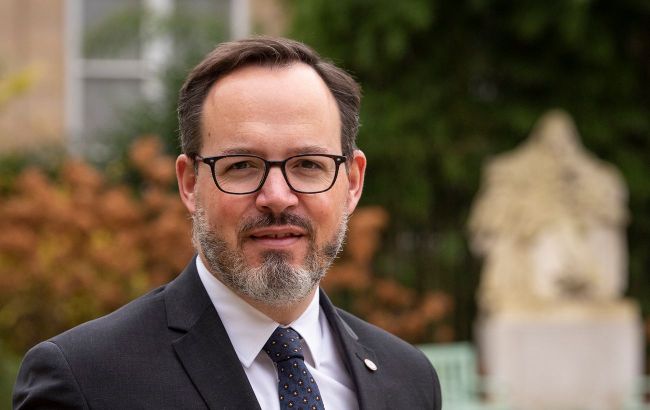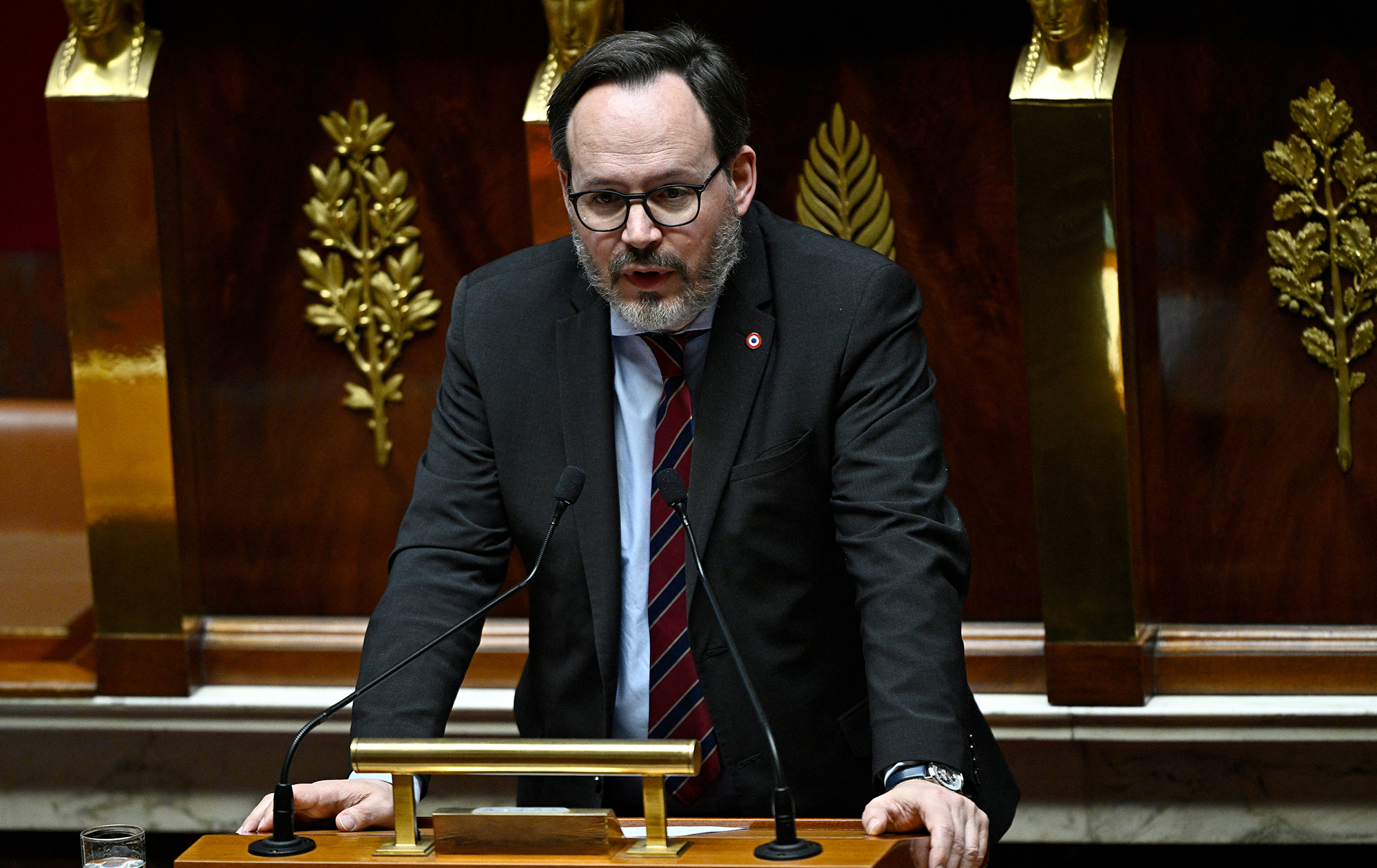'Main subject for the USA is China, not Russia,' Bertrand Bouyx, head of French delegation to PACE
 Bertrand Bouyx, vice president of PACE and head of the French delegation (Photo: bertrandbouyx.fr)
Bertrand Bouyx, vice president of PACE and head of the French delegation (Photo: bertrandbouyx.fr)
In the interview with Bertrand Bouyx, head of the French delegation to the Parliamentary Assembly of the Council of Europe (PACE), RBC-Ukraine discusses Russia's unwillingness to engage in peace talks, relations between the EU and the US, differing approaches to defense within Europe, Russian provocations, and the political crisis in France.
Key questions:
- Why does Trump's unpredictability play into Putin’s hands?
- Have US–Europe relations normalized by the end of 2025?
- Why must Europe take responsibility for its own defense?
- Will France’s political crisis harm Ukraine's interests?
The ongoing political crisis in France — marked by frequent dismissals, appointments, and reappointments of prime ministers — naturally raises concerns in Ukraine, as Paris remains one of Kyiv's key Western allies.
In a conversation with Bertrand Bouyx, a member of the French National Assembly, head of his country's delegation, and vice president of PACE, RBC-Ukraine also raised this issue. According to the lawmaker, if the far-right leader Marine Le Pen were to come to power, the situation for Ukraine would become uncertain. Bouyx, a representative of the center-right party Horizons, does not believe in the sincerity of the French far-right's newly pro-Ukrainian rhetoric.
However, as long as Emmanuel Macron remains president, France's overall course will stay unchanged — the Élysée Palace's host continues to be a loyal ally of Ukraine. Still, Bouyx notes, attention should be paid to the military budget France ultimately approves — since that decision lies in the hands of the parliament, which is beyond Macron's control.
Yet RBC-Ukraine began the conversation with the French deputy in the corridors of the Council of Europe in Strasbourg with other topics — namely, the latest Russian attacks on Ukraine and the state of relations between Europe and the United States in the era of Donald Trump.
– Recent attacks against Ukraine mean that Russia is absolutely not ready for any meaningful peace conversations in any foreseeable future, do you agree with that?
– I think that Putin and Russia don't want peace. Putin will keep trying to push his advantage, and eventually there will be peace once he understands that Europe is strong, that it stands united with Ukraine, that we will not let Ukraine fall, and that he finally realizes we truly support Ukraine, that we will not give up, and that we will always stand together, behind Ukraine, to support it in its war against Russia. We must show no weakness in the face of Russia, in the face of Putin.
Russia must know that we won't leave the Ukrainian people alone, and Russia must know that we will help Ukraine, militarily and financially.
– We have seen a lot of efforts by the US administration, by Donald Trump and his team, pushing for the peace negotiations. In your opinion, why haven't these efforts delivered any practical results so far?
– It's the policy of the United States that raises questions for us. It is full of reversals. We don't know what is at the moment the opinion of Trump about the situation in Ukraine. This instability is not a good policy, with a man like Putin, because we have to be strong, and we don't have to be weak in the face of Putin, and when you're showing that you are not quite stable on your decision…
– Do you mean President Trump?
– Yes, that means weakness for him, and that he can still go on with the war against Ukraine. The uncertainties in US policy benefit the adversary — and therefore benefit Russia — because they thrive on those uncertainties. Having financial support that isn’t stable actually weakens the logistical lines of the Ukrainian army and prevents a consistent sustainment of the war effort. This, in turn, works to Ukraine's disadvantage and leads to an incoherent strategy.
– We all remember how the US administration started their cadency, with JD Vance's speech at the Munich conference, Trump's speculations that Europe is weak, Europe is not paying, and so on. It seems that transatlantic relations have become way better since then. But still, is the United States a partner of Europe, as it was a year or three years ago?
– Yes, the relationship between Europe and the United States is still alive, but we have different views and objectives. I think that the United States is still concerned about China. The main subject for the USA is China. It's not Russia.
I think for Donald Trump, the major subject in Europe is the future of NATO. The main subject for Donald Trump with Europe is to say to Europeans: now you have to take your future into your own hands. That means that now you have to pay for your own defense. Because we have another subject, it is China. And for the moment, European countries must think for their own defense. We are not weak, but we are not coordinated.
– Inside Europe?
– Yes, but we are not weak. Now we are making a major financial effort for our own army.
– That 5% expenditure commitment?
– Yes, and we can do it. But I think that the main subject is coordination. In the French National Assembly, I'm part of a working group looking at how we can coordinate our European defense with NATO, how we can use NATO for the European defense, meaning that we don't have to double the command because we have that with NATO. So we're looking at how we can be intelligent, pertinent to build something new with NATO, and that can be used in Europe.
– Can Europe, and France in particular, still rely on the US as a defensive umbrella, especially in the wave of recent Russian attacks and provocations?
– France is very independent in its defense. It was the decision of General de Gaulle to be very independent. We have different views in Europe. There is an Eastern view and a Western view. In the Eastern view, I understand that they still rely on the USA military material.
– Western view – do you mean European countries to the west of Poland?
– Yes. Because we have different military traditions. I think this is not a problem. But now we have to build something new, and we have to rely on our own industry.
We can still buy some US material because our policies on that subject are different. But we must be aware that when we don't buy European, it's not good for our own industry. So every country has to make an effort on that subject.
We have to build strong links between our own national industries in Europe, and we have to cooperate more on that. That means that we don't have to cut the link between us and the USA because we have different needs, but we have to prioritize our own production.
There is a treaty between France and the UK about nuclear weapons and the common interest in their use. You asked me about the nuclear umbrella. That means that there is an ambiguity, a strategic ambiguity between the UK and France about their common interest in Europe. That means that somewhere in Europe, there is a common interest between France and the UK to protect the interests of France and the UK, and maybe other countries in the European Union. And maybe larger than the European Union. It's the famous strategic ambiguity.

Bertrand Bouyx during the French parliament's discussion of the resolution on the use of frozen Russian assets (photo: Getty Images)
– And what's your opinion on NATO's reaction to this particular drone attack on Poland?
– In my opinion, it was a good reaction. Maybe it could be better. But we are always on this thin line between us and Russia.
So we have to be aware that if we destroy a drone or maybe one day, like Türkiye, shoot down the plane, it could be a declaration of war.
There is now a big will among the European countries to fight back against Russia. And this is, I think, a major change in the situation.
– In the minds of European politicians?
– Not only politicians, but also in public opinion. Because now we see drones in Germany, Sweden, and Denmark. France regularly sees Russian planes flying nearby or submarines passing off its coasts. So there is a real concern today about this situation. It's something that has crossed an additional line.
And so the reaction in Poland is already quite distant, actually. Even though, in terms of time, it was recent, it already feels far away — the patterns of response have evolved since what happened in Poland, I think. Because now, in Germany, they said that they would shoot down every drone in their airspace.
– France is a crucial partner for Ukraine. Does this ongoing political crisis in your country, the changes of governments, pose any danger to us, Ukrainians, or is it purely your internal matter that we shouldn’t worry about?
– If there is a change in the government and, say, Marine Le Pen comes to power – I don't know what the situation could be for Ukraine. Because we know that Marine Le Pen had a position very much in favor of Putin and of Russia. And we know that Marine Le Pen had a financial link with Russia. So changes in the French government are risky.
– She has changed her rhetoric a bit, as far as I know.
– Yes, for the public, because it's not popular.
– But she's not sincere, in your opinion, is she?
– I think she's not sincere, because she shares many, many radical values with Vladimir Putin. So I think she's lying.
– But as long as Emmanuel Macron remains President of France, we aren’t really in much danger, are we?
– No, because there is still a will to increase the amount of the military budget in France. And on that subject, I think, there is no change in policy. And President Macron is still supporting Volodymyr Zelensky, is still supporting the military effort for Ukraine.
– So before the next presidential election, we shouldn't expect something bad, should we?
– We have to be aware only of the new budget, because we have to be vigilant about not cutting the military effort in France. And the budget has to be approved by the National Assembly. Yes, because we have to be prepared in the eventuality of war, and we are working on that.

